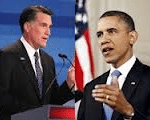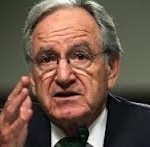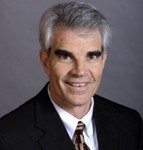![The 2012 Presidential Debates: When Moderators Aren’t Moderate]()
by | Aug 23, 2012
 Lost in the sea of coverage following Mitt Romney’s selection of Paul Ryan as his running mate, was the news that the moderators for the three Presidential debates, and one VP debate, were also selected.
Lost in the sea of coverage following Mitt Romney’s selection of Paul Ryan as his running mate, was the news that the moderators for the three Presidential debates, and one VP debate, were also selected.
There is a certain kind of news one receives that falls into the category of “this may or may not be bad—but it can’t be goodâ€. For Republicans, learning of the moderators that will be at the helm for these four debates certainly earns this distinction.
In order of appearance they are- Jim Lehrer (PBS News Hour), Martha Raddatz (VP Debate-ABC News), Candy Crowley (CNN), and Bob Schieffer (CBS News).
Since the Romney campaign had to sign off on each moderator, it is hard to imagine that they could not have demanded better (even given that the Obama camp also had to sign off on each). By any measure, Jim Lehrer, Candy Crowley, and Bob Schieffer all lean to the left, and the networks that employ them all trail badly in the ratings to their direct competition.
Even if you were to say that these three were the fairest that both sides could agree to, giving a green light to Martha Raddatz for the VP debate was certainly inexplicable. The reason for this being, she is a “foreign affairs correspondent†which is not Ryan’s forte, and in fact he was brought into the race for his economic mastery. One has to wonder how much focus will be put on non-domestic topics just based on her area of expertise. On the surface this seems a major concession to the Obama campaign, and one that needed not be given.
The reason these moderators are so important is three-fold. First, with all the polls showing that the election has a likelihood of being razor-close, every small detail that goes into them has a chance to be huge. Second, like was the case with the Republican Primary debates, these four showdowns will smash records for viewership and the audience will include millions of Independents sizing up the candidates for the first time. Lastly, and most importantly, the questions asked of the candidates have the ability to dominate the crucial weeks of news cycles leading up to Election Day.
So What Should The Focus Be?
Poll after poll shows that for the American people ground zero in this election is the economy. A Pew Research Poll taken from June 7-17 asked voters to name the top issue that they will be considering in the voting booth in November. The top four answers were Jobs (35%), the Budget Deficit (23%), Health Care (19%), and Social Security (11%).
The danger in having biased moderators was on full display for the Republican Primary debate moderated by George Stephanopoulos, when, seemingly out of nowhere, he felt the need to drill down with Mitt Romney and Rick Santorum on the issue of female contraception. This gave birth (no pun intended) to the Sandra Fluke phase of the campaign and a multi-week sidetrack by the media away from the serious issues of the day. There is simply no doubt that, should they choose to, a moderator can actively push the focus to issues that are not widely being considered by voters—and into territory that favors one candidate or another.
As will be the case in October, it just so happens that the issues voters themselves say are paramount are the exact issues that President Obama is desperate to avoid talking about. In theory this would make the debates a huge opportunity for Romney and Ryan to drive home their message—something tells me it won’t quite go down that way.
Perhaps I will be proven wrong, but will these moderators have the gumption to ask President Obama why a myriad of the promises he made while running in 2008 have been unachieved or even un-attempted? Will they remind the American people that twice the President had budgets voted on by Congress, and he failed to receive one solitary vote for either of them? Will they ask why he promised to cut the deficit in half but instead oversaw three years of trillion dollar plus deficits? Or will they inquire why he has not laid a plan on the table for reforming entitlements, after saying himself this was crucial in 2008?
Republican Are Right to Be Nervously Skeptical
All things being equal, and according directly to the polls, the topics discussed during all four of the debates should almost exclusively be jobs, the deficit, the long term health of entitlement programs, and foreign policy. What I fear instead is painful subjection to multiple questions on gay marriage, abortion, contraception, and student loan debt— knowing all the while the fruit is rusting on the vine.
It is true that the level of professionalism that the four moderators will show is yet to be determined, and perhaps at least three of them will be fair (I hold no hope for Bob Schieffer). But given the track record of behavior the major media outlets have shown to Republicans in recent years, I’d say a mildly-crippling nervousness is more than justified.
After all, barring a phenomenal performance by both Republican candidates, one thing is certain—“it may or may not be bad…but it won’t be goodâ€.
The post The 2012 Presidential Debates: When Moderators Aren’t Moderate appeared first on The Conservative Reader.




by | Aug 16, 2012
 The following is an interesting study released recently, and the reaction by the GOP (written up by Jill J.).
The following is an interesting study released recently, and the reaction by the GOP (written up by Jill J.).
In a policy study released by the Public Interest Institute at Iowa Wesleyan College, author Amy Frantz analyzed Iowa’s teen unemployment situation. The report notes Iowa’s unemployment rate for teens has remained consistently high over recent history. Two subgroups are analyzed within the data: teens ages 16-19 and high school graduates 18-20 years old.
The report notes that the unemployment rate for the 16-19 year old group was at a very high 12.3 % in 2002 and over the course of the last decade has remained at the high level, with the most recent report for 2011 showing that the unemployment rate for 16-19 year olds was 13.8%. This is much higher than the overall unemployment rate in Iowa which was just below 6% in 2011. Similarly, the 18-20 year old high school graduate group’s unemployment rate was 9.6% in 2002 and has risen higher, peaking in 2010 with a rate of 19.3% before coming down below 18% in 2011.
Not only are the unemployment rates higher, but an analysis of the number of hours worked for these two groups has seen a reduction in the last decade as well. The average number of hours worked per week for the 16-19 year olds in 2002 was 12.5 hours, but has dropped to 8.1 hours per week in 2011. Again, the 18-20 year old high school graduates faced a similar situation wherein their average hours worked in 2002 was 21.1 per week, falling to 16.7 hours per week in 2011.
The study references the rise in minimum wage as one of the driving forces behind the tremendously high teen unemployment rate. Iowa’s minimum wage was raised by the Iowa Legislature and Governor Culver in 2007 from $5.15 per hour to $6.20 per hour, and then in 2008 it was raised to $7.25. The federal minimum wage was also raised by the Democratically-controlled Congress, up to its current level of $7.25 an hour, matching Iowa’s rate. The study links this rise of the minimum wage to the increase in teen unemployment rate, noting that “teenagers are five times more likely to earn the minimum wage than adults. Thus the impact of an increase in the minimum wage would be felt dramatically by that segment of the workforce.†Those most hurt by a rise in minimum wage are often the youngest and most unskilled workers as businesses cannot afford to pay increased wages for individuals that might not have the necessary training or productivity to bring to the business.
Lastly, the study proposes an idea on how to lower the teen unemployment rate in Iowa. The study proposes to create a “sub-minimum†wage for teen workers in the state, which would allow businesses to pay certain teens an amount below the minimum wage that would apply to all other workers. The study concludes with the observation that “The benefit of having a higher minimum wage is cancelled out if teen workers are receiving fewer hours of work. And for those teens that want a job but cannot find one, their wages are $0.â€

by Art Smith | Aug 10, 2012
 It may be a matter of opinion, but I was a bit disappointed with Wednesday’s Iowa Energy Forum‘s “A Conversation On Energy Luncheon” event at Hy-Vee Hall in Des Moines. A similar event was held by the group, which is sponsored by the American Petroleum Institute, last year (May 25, 2011). One might think that an event hosting two sitting US Congressmen (Leonard Boswell-D and Tom Latham-R) who happen to be running against each other in this year’s election would be an opportunity to have some real discussion about the issues impacting Iowa and American energy concerns, but compared to last year’s event this was a bit of a yawner.
It may be a matter of opinion, but I was a bit disappointed with Wednesday’s Iowa Energy Forum‘s “A Conversation On Energy Luncheon” event at Hy-Vee Hall in Des Moines. A similar event was held by the group, which is sponsored by the American Petroleum Institute, last year (May 25, 2011). One might think that an event hosting two sitting US Congressmen (Leonard Boswell-D and Tom Latham-R) who happen to be running against each other in this year’s election would be an opportunity to have some real discussion about the issues impacting Iowa and American energy concerns, but compared to last year’s event this was a bit of a yawner.
Last year we got a panel of experts from the Iowa energy industries discussing what’s actually being done to expand the development of various energy technologies, including a strong speech by Governor Terry Branstad, and gobs of data regarding energy production and consumption in Iowa.
This year we got mostly platitudes and commitments to vote for good energy policy.
Both congressmen had an opportunity to speak without hearing the other speak first and then answered a few written audience questions.
Leonard Boswell
Congressman Boswell was rather distracted at first with pointing out his military record, which was totally irrelevant to the topic, and although he proclaimed support for the Keystone Pipeline he hedged regarding the routing of the pipeline as the only obstacle for approval of Keystone. His message is essentially that we need “all of the above” solutions for energy independence, and that we need to upgrade the energy infrastructure including improvements to the electrical grid and expansion of natural gas fuling stations along the major interstates.
Boswell also made a point of discussing the impact of climate change on general infrastructure… he provided an anecdotal story about someone in Alaska that was showing him a location where the ground was dry and supposedly had 10 feet of ice many years ago. His punchline for this was that permanently frozen ground did not require digging foundations for supports, but now that areas of the country are losing their permanent frozen ground, those things built on them have to be rebuilt. Although I think the topic is worthy of discussion (and I give Boswell credit for not discussing the idea of human causality), I never got the connection to energy independence. Maybe I’m slow.
Tom Latham
 Tom Latham expressed the same support for Keystone sans concerns about the route. He made an excellent case for the fact that in the early ’70s, our leaders in Washington said we would never have another oil crisis because we would ensure that we had a fully independent domestic oil resource… but as soon as OPEC opened up the spigot we apparently forgot all that. 40 wasted years.
Tom Latham expressed the same support for Keystone sans concerns about the route. He made an excellent case for the fact that in the early ’70s, our leaders in Washington said we would never have another oil crisis because we would ensure that we had a fully independent domestic oil resource… but as soon as OPEC opened up the spigot we apparently forgot all that. 40 wasted years.
Not only did Latham attack Cap and Trade as ill conceived, he pointed out that the EPA was preparing to release a number of regulations the day after the election, each expected to cost Americans over $100 Billion, modeled after the failed legislation.
Latham also explained that with over $70 Trillion in long-term unfunded liabilities, expanding domestic energy production would bring the government tens of Trillions of dollars to fund those liabilities.
All in all, I appreciate both congressmen taking the time to share their thoughts about energy. I would rather (or additionally) had some Iowa specific information provided at the event like last year. Although the conversations with the congressmen were somewhat interesting and perhaps relevant to the upcoming election, the fact that the format was specifically non-partisan, non-debate, non-confrontational kept the whole impact very low. I’m not really saying it should have been an election showdown… I’m just saying I could have gone to the two candidates web sites to get the total information I got at the forum and used a much smaller part of my day to do it. I think this organization would do well to focus on promoting Iowa Energy production and the impact it is having on Iowa and the US.
The food was really good though. (grin)
The Playground
Probably the most interesting conversation happened outside the event while Boswell held his media availability. Short version is this: my friend Kevin Hall of The Iowa Republican had the “nerve” to ask the congressman whether he still supports Cap and Trade. This set off a firestorm of reaction from Boswell’s staff who could not believe the audacity of a mere “blogger” to represent themselves as “media” and ask the important man from Washington a question that doesn’t need to be asked.
Yes, that really happened.
I don’t want to spend the 10 ‘graphs that I have pent up inside explaining why this topic frustrates me (you’ll get them soon enough). It’s not worth the time right now, and keeping this to the “short” version, I just want you to know this was the most childish response I’ve ever heard to a hard question. It is to Congressman Boswell’s credit that he did not join in the behavior of his staffers and answered the question. You can read the whole story from Kevin here.
Oh, and the congressman said “Yes”. Of course he still supports Cap and Trade.
Other commentary and analysis of the forum: Caffeinated Thoughts, The Des Moines Register, and more Des Moines Register.
Photo 1 © vencav – Fotolia.com
Photo 2 © The Conservative Reader.

by Steven Waechter | Aug 7, 2012
 Our esteemed Senator Harkin has been holding some hearings on for-profit colleges back in D.C., and now he has penned an editorial for the Des Moines Register. In full disclosure, I dislike Tom Harkin. Intensely. Then again, back in 2008, Charles Grassley voted for the TARP bailout, and now I don’t like him either.
Our esteemed Senator Harkin has been holding some hearings on for-profit colleges back in D.C., and now he has penned an editorial for the Des Moines Register. In full disclosure, I dislike Tom Harkin. Intensely. Then again, back in 2008, Charles Grassley voted for the TARP bailout, and now I don’t like him either.
But, back to the junior Senator from Iowa; Senator Harkin penned an opinion-editorial decrying the high tuition, poor student outcome, and massive debt of the students of for-profit colleges. If somebody would be so kind as to pass this on to the right honorable gentleman, would Senator Harkin please explain why his criticisms of the for-profit colleges are not extended to all colleges? Why does the servant of the people limit his criticism to the obvious failures of the for-profit schools, and not touch upon the failures, just as obvious, of the Ivy League, non-profit schools, endowment liberal arts colleges, and even state schools?
I have three reasons which instantly spring to mind. First of all, Mrs. Harkin sits on Iowa’s Board of Regents. I don’t think Senator Harkin mentioned that; being a bachelor myself I’m only assuming that it would be appropriate to disclose that information.
Second, college professors and administrators appear to have privileged status in modern American society, and being part of the Nomenklatura (Russian for “Book of Names,†these were people who had earned favors from the members of the Communist Politburo), colleges can’t possibly be permitted to suffer the effects of a recession. After all, if your waitress doesn’t have a degree in sociology, how can we possibly have justice and compassion in our society?
Thirdly, and I think probably the most important, higher education is critical for the current political climate. We are in a deep economic depression and college is a useful way to keep young people busy. It gets them out of their parents’ houses, gives older voters the illusion that the young will be able to support themselves and fund the welfare state, and gives elected officials a ready-made line for why they need to be returned to office and why the public needs to turn over their wealth to the state -because children are the future, and we need to invest in our young people.
Political careerists have used that stupid old trope for decades now. We must, they tell us, rack up enormous debts – as a nation and as individuals – for the sake of the children, who will then grow up as serfs and endure an intense curtailment of their liberty and prosperity to settle the debts that we racked up for the sake of the children. It’s a bit like selling your car for gas money.
So, hurry up and enroll your kids in a state school, and make sure to cosign the Federal Stafford Loan promissory notes. Of course, you need to make sure you reelect your local deputies of the Supreme Soviet to make sure your kids can still get the chance to sign those promissory notes. Our economy, after all, is built on an Education-Employment model, where young people go to college so they can become more attractive to employers – employers who no longer have access to the capital they need to expand their businesses; considering that is where new jobs come from, that might be a bit of a problem – so unless your kids borrow money from the government to get an advanced degree, they might not get that job that doesn’t exist.
More than fifty percent of recent college graduates cannot find full time employment. All of them could get funding for a master’s degree if they really wanted it, though. It doesn’t mean anybody will have the capital to invest in employing them two or three years from now, but it will keep them busy and not officially part of the “unemployed.â€
So, there you have it; as long as federal money is being funneled to state schools to cover exorbitant tuition for degrees not worth the paper on which they are printed, our dear Senator doesn’t seem to mind. I actually agree with Senator Harkin when he condemns the for-profit colleges; but he attacks them for being for-profit, not for being useless. I attack them for being useless – the same sin committed by most every college and university in the country, regardless of who runs them.
No career politician has the courage to take on the real problems facing the American economy, so perhaps Senator Harkin doesn’t warrant extra criticism for his cherry picking and selective righteousness – he certainly doesn’t deserve any credit, either.

by | Jul 24, 2012
 While much of the attention and focus when we head out to vote in November will be on the various partisan political races on the ballot, residents of Polk County will have another very important decision to make–who will be guiding the law enforcement efforts that protect us.
While much of the attention and focus when we head out to vote in November will be on the various partisan political races on the ballot, residents of Polk County will have another very important decision to make–who will be guiding the law enforcement efforts that protect us.
Though it may surprise many, the reason this is important is that some very basic laws on the books are being relegated to the back burner by current Sheriff Bill McCarthy–who has instead decided that the crack down we need is on those breaking the speed limit. While many living in the suburbs are unaware, not all places in Polk County are as safe as the neighborhoods most of us live in. The emphasis and aggressiveness in enforcing current law is vital to improving our safety, protecting our rights, and stamping out problems before they become out of control and directly threatening.
Opposing Sheriff McCarthy this November is Dan Charleston. I would encourage all of you to take a minute and visit his website – Charlestonforsheriff.com – where he goes into detail on the many hot-button issues that are on the table and how he would approach his law enforcement duties in general.
He was kind enough recently to answer some questions for The Conservative Reader: Iowa–mainly focusing on the impact a new Polk County Sheriff could have if he is elected in November. Here is what he had to say:
Should you defeat Bill McCarthy in November, what are the top three things that the citizens of Polk County would notice a change in?
Honoring the Oath of Office and ensuring the protection of individual rights as laid out in the US Constitution and Bill of Rights, will be the first priority when elected Sheriff. We will lead together with innovative ideas and solutions to better serve our community. This will restore faith, hope, and the belief that there is a better future for our families and our right to life, liberty and the pursuit of happiness.
The Polk County Sheriff’s annual budget is over sixty million dollars. The 2011-2012 budgets will bring a mandatory cut of more than 2.5million dollars. There are many ways to accomplish this: retirements, reallocation of top management positions to line staff, inmate food service, fewer take-home cars for positions which do not require one, alternative work schedules, and management to staff ratios brought within the national average. This does not require the loss of staff jobs or a consulting firm’s opinion at taxpayers’ expense.
Recently the Sheriff and board of supervisors voted to allow speed cameras placed in vehicles throughout Polk County. I believe this is unconstitutional based on the sixth amendment. I would not allow the use of speed/red light cameras in Polk County and would lead the effort in getting them removed throughout the entire county.
What would your top priorities be on day one, and how would you best describe your managerial and law enforcement philosophy?
I believe the top priority at the Polk County Sheriff’s Office is to restore the morale of the staff. There is a lack of faith in the leadership which affects the work ethic and overall attitude of the employees.
I believe in maintaining service before self; doing more with less; providing fiscal transparency, common sense solutions, honesty, accountability, trustworthiness, respect, loyalty, and fairness. I also believe in community and an attitude of service shown to the people whom we serve as law enforcement professionals in Polk County.
I believe a law enforcement organization cannot expect to grow and prosper if the skills of its people do not consistently do so. I believe in leading by example through realistic training, innovative ideas, on-going law enforcement education and common sense solutions when issues arise.
I believe that when we promote great leaders, it affects the work ethic, self- worth and pride of our organization, which will then be apparent to the people we serve. I believe Integrity is the most important thing a man or organization can possess, and with it, pride and a humble spirit is shown.
How has the campaign been going? Was there one event or occurrence that drove you to run for this office? Name one impact that a high quality County Sheriff can have on a community that might surprise some people?
The campaign has been going outstanding. The volunteers, radio, TV, webcasts, house parties, public speaking and parades have been very rewarding and informative.
Having been in the military and worked for Los Angeles Sheriff’s Department, I have been a part of first class organizations. Having this experience gives me better vision to see where Polk County needs improvement in its law enforcement practices. Through proactive law enforcement, we can reduce gang activity, drug trafficking, illegal immigration, and unconstitutional speed cameras and lead the way for constitutional carry in this great state of Iowa.

by | Jul 22, 2012
 While every Republican in Iowa has been wishing that Randi Shannon would withdraw from public view just quickly as she withdrew from the ballot 10 days ago–it appears this will not be the case.
While every Republican in Iowa has been wishing that Randi Shannon would withdraw from public view just quickly as she withdrew from the ballot 10 days ago–it appears this will not be the case.
Instead of going away quietly she has chosen to, of all things, go on a publicity tour to promote her appointment as “Senator” in a new government called “The Republic of the United States of America“. On July 13th she released a truly unbelievable letter detailing why she was dropping out of the Iowa Senate race to represent District 34 and joining this new alternative “union”.
The discussion she had with Ed Fallon recently is below (via The Bleeding Heartland), for an entertaining and jaw-dropping 15 minutes of video fast forward to the 10 minute mark and watch till around the 25 minute mark. This is one of the few times I have felt truly sorry for Mr. Fallon.
[wp-youtube]NsOvb0LTV2w[/wp-youtube]

by | Jul 19, 2012
 As the campaign manager for John Landon throughout the primary, I made a concscious decision to not write any opinion, analysis, or news pieces regarding this race on this site. With the conclusion of the primary coming at a special convention held last night at the Kirkendall library in Ankeny, this moratorium has now ended.
As the campaign manager for John Landon throughout the primary, I made a concscious decision to not write any opinion, analysis, or news pieces regarding this race on this site. With the conclusion of the primary coming at a special convention held last night at the Kirkendall library in Ankeny, this moratorium has now ended.
Per Iowa law, since none of the six Republicans on the ballot garnered 35% on June 5th the results were deemed “inconclusive” and this meeting of Ankeny area central committee members was called to decide the winner. Four of the six candidates who appeared on the primary ballot were nominated for consideration by the 21 members of the central committee who were in attendence.   What could have become a long and drawn out affair actually ended rather quickly, as the process took only two ballots to yield a decision.
Each of the four were given four minutes apiece to address the committee, which was followed by a secret ballot. All made their case by giving very good speeches, each of which centered around a very Conservative message. The first ballot of voting resulted in 10 votes for Landon, 10 votes for Matt DeVries, and 1 vote for Jim Robidoux. On the second ballot, Landon won by a count of 12-9 over DeVries.
After having gone through this campaign for several months now, I can say with certainty that all six candidates were worthy and qualified to represent HD 37, and I am left with a deep respect for all. Jim Robidoux (who finished with the most votes on primary night), Matt DeVries (who finshed in second), and Jeff Wright (who placed 4th on June 5th) are all assets to the Republican Party. I have little doubt that each will continue to be politically involved in Ankeny and will be heard from again on future election nights–which is a good thing for the Republican Party in Iowa.
Below is the full text of the press release issued by John Landon at the conclusion of last nights convention:
Every candidate in this race, including myself, made the decision to run for this seat in the belief that they were best qualified to represent and serve the people of our community. I was prepared to accept any decision the Central Committee made, and I am humbled by the faith and support that they have shown for me tonight.
For years I have been working to build and strengthen the Republican Party in this district, and I am greatly looking forward to continuing to advance our core principals of less taxes and more freedom in the State House next session. Though the sheer number of great candidates in this race led to a long and drawn out process, now that it is over I want the people of House District 37 to know that I am a rock solid, Conservative Republican who is energized and ready to fight for their interests in the legislature.
There is much work to be done, and my life experiences and long business career will allow me to start this work in earnest on day one. The Republican Party will win this seat in November and I look forward to casting the votes necessary to strengthen our state and create an environment that will allow all Iowans to flourish.

by | Jul 11, 2012
 After easily defeating a primary challenger in June, Iowa House member Kevin Koester was kind enough to sit down with The Conservative Reader: Iowa to discuss his upcoming general election in November, as well as the many issues he will be dealing with should he earn a third term in the Iowa Legislature.
After easily defeating a primary challenger in June, Iowa House member Kevin Koester was kind enough to sit down with The Conservative Reader: Iowa to discuss his upcoming general election in November, as well as the many issues he will be dealing with should he earn a third term in the Iowa Legislature.
The Primary, The General Election, and the Pulse of House District 38
The process of winning re-election for Rep. Koester began even before the legislative session ended, as the first order of business was winning a primary challenge by Saylor Township resident Brett Nelson. As the session ran long, Koester made several hundred phone calls in his downtime and began getting acquainted with the voters in his newly re-drawn House District 38.
He handily defeated Nelson 456 to 80, and took many positives away from the effort this challenge required, “I’m very grateful for both the margin of victory and for the experience of the primary because it really helped energize my campaign for November, and gave me a great familiarity with the new territory in the district.â€Â In an interesting aside, after not meeting or speaking to each other throughout the primary, the two have since met and Nelson even took up an offer by Rep. Koester to join him in a weekly bible study—a great, albeit rare, good ending to a primary challenge.
Talking to voters throughout this process affirmed to Rep. Koester that the dominant issues for his November show-down with Democrat John Phoenix will include the state budget, government over-spending, and the economy. Besides these economic issues, the background of the two candidates, combined with the issues still facing the legislature, serve to telegraph the subject matter that will be front and center in this race—education reform and public sector unions.
While Koester has decades of experience with education in Iowa, Phoenix was elected to the Des Moines School Board where he served for six years. In addition to this, Phoenix also has been a long-time union steward, has already been endorsed by the AFL-CIO, and strongly believes that “unions help make our country stronger and improve the lives of all workers.â€
Speaking to these differences, Rep. Koester believes that, “because of his role and his voice on collective bargaining issues and union viewpoints, there will be plenty of distance between us to give the voters a clear choiceâ€. Given the fact that Mr. Koester is a strong Conservative Republican and Phoenix is a pro-union, former school board member who featured Des Moines super-liberal Ako Abdul-Samad at his first fundraiser—the gulf between the two is likely to be enormous on a long list of issues. Here is a look at two of these issues, and where Rep. Koester stands on them.
Education Reform
Like most Iowa Republicans, Mr. Koester was very disappointed in the progress made on education reform by the last General Assembly. “The things we voted on last session were not reforms, they were Band-Aids. We did not do surgery, and that is what is truly needed.â€
After seeing countless specific and detailed proposals get torn apart by the opposing sides, he stands ready to work on a broad frame of reform that can be agreed on in principle and passed. “What I have is a drive to dismantle the fluff, and no patience for the simple arguments that only serve to attack valid ideas. We need to stop the nit picking and the warring, and come up with a product and move forward on it.â€
Two realities in the current system that he sees as negatively affecting students are the lack of teachers being removed for poor performance and the practice of “last in first outâ€, which is the seniority structure that protects long-time teachers from being let go, in favor of removing less tenured teachers when staff sizes are cut. This practice has long been under fire by Republicans because it refuses to take into account the skill level and effectiveness of each teacher. “Last in first out is bad for kids. We need to look at who is performing and have that be the prime focus, and not necessarily just who has the most experience. A pay raise needs to be given for performing better, not just given out for coming back the next year and being a year olderâ€.
In terms of the reforms needed to reverse our recent embarrassing trend in education, the crucial ingredient in Rep. Koester’s view is to quantify the performance of the employees in our education system. He will not support any proposal without this component, and he concisely summed up his position on education by saying:
We will have meaningful and fundamental reform when we agree on how we are going to measure student learning, how we are going to measure each of our Principal’s leadership and influence in the classroom, and how we are going to measure teachers and instruction. That is where the rubber meets the road on this issue.
Unions and Collective Bargaining
With Governor Branstad recently signaling a desire to look at their financial impact on the state, and John Phoenix’s close personal ties to them, there is little doubt that public sector unions and collective bargaining will be hotly debated in this race.
Rep. Koester has already taken several votes on this issue, all with the goal of bringing public sector unions more in line with the realities of the private sector, and attempting to prevent the payouts involved from breaking the bank as we have seen in several other states in recent years.
The votes he has taken include voting three times for employees of the Legislative branch, including himself, to pay a portion of their health insurance cost. The first was for a contribution of $50 a month, the second for a $100 a month, and the third for $200 a month. “I have gone on record every opportunity I have had insisting that Legislators are charged something, and I strongly believe that all state employees should help pay for the cost of their health insurance.â€
He also voted in favor of the measure that went into effect July 1st, which changed the formula for calculating retirement benefits for state employees. In the past payouts were figured using an average of an employee’s top three wage earning years, which has now been changed to take the average of the top five years.
In the larger picture, he supports having a policy ensuring that the number of government employees does not swell beyond what is needed and can be financially sustained in the long run. To this end he favors implementing breaks on the growth of state government that ties the number of workers and salaries to the overall growth of our state economy, and prioritizes the issue the following way:
I want to start with how we plan for how many state jobs there will be. You don’t grow the economy by growing the number of public jobs—that is socialism. The second thing is then addressing the disproportions in the health insurance contributions and the retirement benefits. The benefits are out of control compared to what the private sector is doing, and to what Iowa taxpayers are doing to take care of their families. We need to get those things in line, and what is fair for the rest of Iowans should be fair for the public employees that they are paying for.
Next Stop: November
Anyone who talks issues with Rep. Koester immediately realizes that he has a deep grasp on nearly all of them, including all the moving parts involved with each. On substance, he can go toe-to-toe with anyone and will shine in the public forums and debates with Mr. Phoenix.
As this contest slowly unfolds till November, the topics these two candidates debate along the way will be a roll call of every major issue facing the citizens of Iowa. In particular, the colliding ideologies on taxes, education, and public sector unions will be a true foreshadowing of the debates that will consume the next General Assembly.
How strong a candidate John Phoenix will be remains to be seen, but Republicans throughout Iowa and HD 38 can be assured that Kevin Koester is up to the challenge—and will remain a strong Conservative voice for the Party in the coming years.
![The 2012 Presidential Debates: When Moderators Aren’t Moderate]()
by | Jul 6, 2012
 The bedrock of winning elections at every major level of politics is building coalitions of supporters for whom you can count on to head to the polls and cast a vote for you. Especially in a country as large and non-monolithic as ours, coalition building on some level is a requirement for victory and often explains why politicians are so willing to speak often, but say very little.
The bedrock of winning elections at every major level of politics is building coalitions of supporters for whom you can count on to head to the polls and cast a vote for you. Especially in a country as large and non-monolithic as ours, coalition building on some level is a requirement for victory and often explains why politicians are so willing to speak often, but say very little.
A close look at President Obama’s effort in this area reveals that he has elevated this process to an art form—but far from art, what he has created is an ugly picture beneficial to himself, but terrible for America.
While the Supreme Court’s ruling on Thursday to uphold the Affordable Care Act certainly carries the negatives of energizing Republicans and leaving him to defend a tax increase, it is foolish not to acknowledge the potential political windfall that he has unleashed. He has managed to cement a new member in his group of coalitions—a group with millions of potential voters.
As we have discussed here before, for decades the Democrat party in America has used the social safety net and the laws of this country to build a formidable coalition of voters. The newest members are the up to 33 million people who will now be guaranteed health insurance by virtue of being a breathing American. For the first time in history an American president will be able to say ‘if you vote Democrat you will have (possibly for free) health insurance, and if you vote Republican you will not’, a potent motivator.
The addition of the health care voter coalition can now be added to the two others that he has bolstered recently, in what may be the most cynical and politically motivated two months in American presidential history.
First it was going on record with the news that he had “evolved†on the issue and now supports gay marriage. This was followed by a surprise move to essentially remove the possibility of deportation for young illegal aliens. While the gay community is relatively small, bolstering his claim to the Hispanic vote was a huge benefit to his Electoral College math. Early next week, we will have a story detailing how the health care law really has more to do with sealing up the Hispanic vote than anything else.
Besides the Latino vote, Obamacare allows the Democrat Party to further stack the deck against Republicans as they try to implement the Social Security, Medicare, and Medicaid reforms in the Paul Ryan budget over the next few years. Top Democrat strategists have to be secretly celebrating, knowing full well that the already difficult politics of reforming these programs just got down right suicidal now that 16 million more people have been added to the rolls.
Moving Forward
The Presidents relentless coalition building will continue from now until November. With the economy not in position to rebound at all, and the two major initiatives of his Presidency either unpopular (health care) or ineffectual (the stimulus), he really has no other choice. I am predicting that sometime in the next few months he will make a shocking public policy jester to the unions, who remain the last sizeable group he has not tried to directly entice.
Though it goes against the grain, at this point I would consider advising Mitt Romney to not moderate on illegal immigration and stay as far right on this issue as he was during the presidential primary. The reasons for this are several.
First, it is the law and the right thing to do—we simply cannot be the only nation on earth that doesn’t enforce its borders. Though many are quick to forget it, this is a message that resonates with nearly all Republicans, and millions of Independents. Second, there is simply no way for Republicans to match what Democrats can offer. While Republicans and Latinos have large overlaps in religious beliefs and family values, Democrats are in essence offering citizenship, free or nearly free health care, and an ever-expanding web of financial assistance that delivers from birth to death.
It may be high time to face the facts—winning over the Hispanic community is not going to happen anytime soon, and the more Republicans bend and soften on these issues the more they enrage fellow Republicans and appear hypocritical to Independents.
The irony here is that many of the Republicans who have been hesitant to support Mitt Romney, largely due to their belief that he tries to be all things to all people, are the same people that are urging him to cow tow to the Hispanic vote and moderate his position on illegal immigration.
There are still tens of millions of Americans who still believe strongly that we are a nation of laws. Should Mitt Romney take a stand on this issue and add this too often ignored group to his list of coalitions, it may end up being a net positive in November.
The post Healthcare Fallout: Obama’s Growing List of Coalitions appeared first on The Conservative Reader.



![The 2012 Presidential Debates: When Moderators Aren’t Moderate]()
by | Jul 1, 2012
 In a Representative Democracy, voting for a particular political candidate or philosophy is the most impactful way a citizenry can change their country. While the “who†a person votes for is what actively shapes a Republic, digging into the motivation behind that vote is far more telling, and ultimately reveals far more about ourselves and where we are heading.
In a Representative Democracy, voting for a particular political candidate or philosophy is the most impactful way a citizenry can change their country. While the “who†a person votes for is what actively shapes a Republic, digging into the motivation behind that vote is far more telling, and ultimately reveals far more about ourselves and where we are heading.
As government involvement in Americans day-to-day lives has expanded, the possible motivating factors at play driving each citizens vote has also expanded—and the effects of this have been devastating. Boiled down to the most basic level, there are two motivations that influence a political vote—you can vote in what you believe is in the best interest of the country, or you can vote in your own personal interest.
In past generations, before the American government was so deeply involved in the giving business, the vast majority of our population largely had only the best interest of the country as a whole to consider. Unfortunately, today nearly half of our citizens have the legitimate option of choosing to vote for their own personal gain at the ballot box.
Not Your Grandfather’s Democratic Party
Though it sounds crass, the modern day Democratic Party has evolved into a selfish group of constituencies that have something to gain in voting for Democrats and against Republicans. While the most obvious entries on the list involve financial assistance from the economic safety net—unending unemployment benefits, housing subsidies, food stamps, Title 19, etc.—in recent years this list has grown to include several other things.
Hispanic Americans can now vote Democrat to ultimately allow their friends and relatives who are here illegally become citizens. Gay Americans can now vote Democrat to gain the right to marry and the economic advantages that come with it. Union members can vote Democrat in order to receive more favorably negotiated salaries and benefits at the bargaining table. Those Americans who, for whatever reason, did not have health insurance can now vote a straight Democratic ticket in hopes of retaining it, since they have now been given it.
In large part this massive constituency of selfishly driven voters explains what the mind-boggling national debt has become so out of control. Far more than any other issue, not running annual deficits and paying down the national debt are two things that are in the best interest of the country—and not necessarily in the best interest of each individual American.  The polling data bears this out showing that, even with the national debt north of $16 trillion, only 66% of Democrats cite lowering this number as a major priority.
Contrarians to this line of thinking will make the charge that Republicans vote in their own best interest by voting for politicians who believe in lowering their taxes. As usual this charge leaves out one unavoidable fact—that the money taken by the government for taxes is earned, and it belonged to the individual in the first place. Put simply, voting to keep more of your own money and not giving it away to a largely wasteful entitlement state (especially one with a progressive tax code) is not a greed driven motivation—rather it is a logical one.
What It Means
The selfishly motivated voter is the single biggest reason why European style democracies are self-feeding, self-defeating, unworkable, and unsustainable. Yet in spite of the real-time evidence playing out across the Atlantic, a near majority of Americans refuse to change course. Increasingly, it is hard not to assume a major reason why American voters are unwilling to do so is that they would be putting themselves out to do so.
The only way to break this cycle is for the Democrat Party to shift away from promising things to an ever-widening group of voters. The sad truth though is that they have built a political base only able to stand upright through some combination of deficit spending, large tax increases, and social pandering. They have become so politically dependent on various sub-groups that making decisions for the economic good of the country, even if they wanted to, would quickly result in them paying a huge political price and losing elections.
Whenever Americans choose to overlook our national interest and instead vote in favor of their own, neither is well served.
The post In the Age of the Selfish Voter appeared first on The Conservative Reader.



 Lost in the sea of coverage following Mitt Romney’s selection of Paul Ryan as his running mate, was the news that the moderators for the three Presidential debates, and one VP debate, were also selected.
Lost in the sea of coverage following Mitt Romney’s selection of Paul Ryan as his running mate, was the news that the moderators for the three Presidential debates, and one VP debate, were also selected.







 While much of the attention and focus when we head out to vote in November will be on the various partisan political races on the ballot, residents of Polk County will have another very important decision to make–who will be guiding the law enforcement efforts that protect us.
While much of the attention and focus when we head out to vote in November will be on the various partisan political races on the ballot, residents of Polk County will have another very important decision to make–who will be guiding the law enforcement efforts that protect us.






